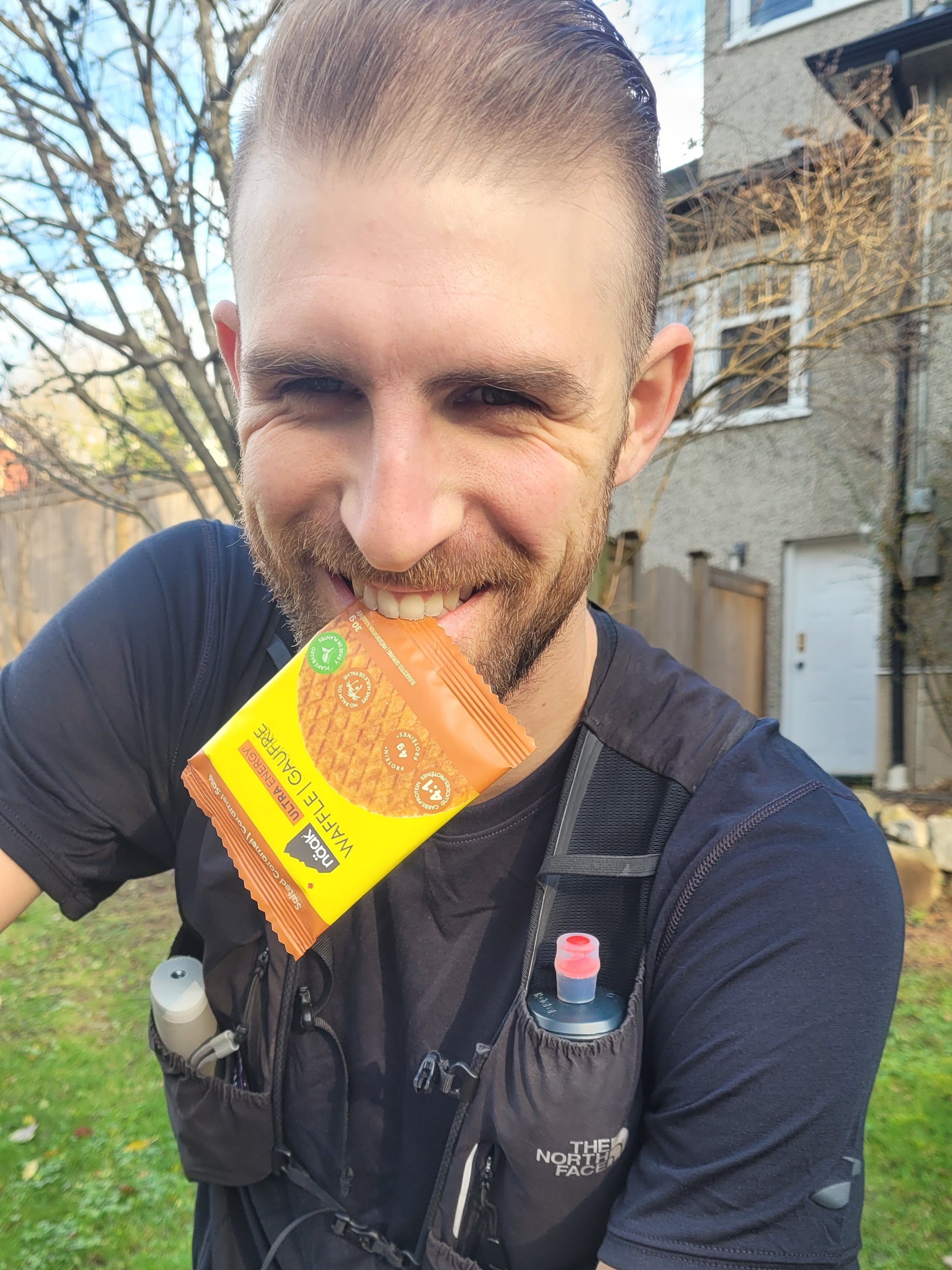On the run fueling
Within the team of athletes we coach and amongst each other, topics around fueling come up A LOT whether it’s within day meals, what to eat on the run, or discussing low energy availability. It’s a lot, and sometimes this information can be heavy and draw up some harmful feelings. So, before we dive into this topic here on the blog, we want to send out a big hug and tons of love to anyone struggling with this. If eating or talking about eating is difficult for you, know you are not alone and know that within this blog post we will be talking about calories and eating in a science based way so this may not be something you want to read right now. We’ll catch you on the flip side when we talk about something else!
Also, as always, know that we aim to deliver the most up to date evidence based information and we feel as running coaches it is critical to discuss and be well informed on fueling as it is a key component of running and performance. For personalized or prescriptive approaches we highly recommend working with an endurance specific dietitian (and we know many so please reach out if you need help finding one)! We are not dieticians and nothing in this post is intended to be prescriptive.
Alright, let’s dive in. We’re going to start with three components of fueling today,
How to fuel and hydrate on the run,
How to start trying different fueling options,
How to fuel pre and post run and for different distances.
Squamish 50mi Fueling for a crew supported aid station
How to fuel and hydrate on the run
Any runs over 90 mins should be fueled since our glycogen stores only last for about that amount of time. However, the more we learn about gut training (general GI tract tolerance to ingestion and digestion in activity), risks of underfueling, and caloric deficits that can be created through consistency in running, the more we want to say there is no physiological harm in fueling on any run of any distance, especially if you might find it challenging to eat enough outside of your runs. Some people only have 60 minutes of glycogen stores so if you are consistently bonking on 90 minute runs, take in some fuel on shorter runs and see if this makes a difference.
General intake guidelines
Over the years we have watched recommendations go from 100 cal/hr up all the way towards 400 cal/hr. It should be noted that the caloric intake recommendation is not based on the physical size of an athlete. We have also watched carbohydrate recommendations come out as a more specific measurement than general calories, though typically running-specific fuel has appropriate levels of carbs per hour, if we are eating enough per hour.
We see many dieticians recommend at least 30 grams of carbs per hour and we have seen success with quite a range including when people are having upwards towards 90 grams of carbs per hour (or about 1.6g/min)
Try to eat EARLY into your run (right from 20-30 minutes). We find most athletes struggle with food intake and GI distress most when either eating the wrong foods for them OR when fueling is delayed, so if eating is hard try it earlier and more often
As a rule of thumb, taking in multiple sugars (glucose/maltodextrin + fructose) is best to maximize absorption and delivery to working muscles
Eat every 20-30 min and don’t get stuck in the idea of 1 gel every 30 min, sometimes if you are eating every 30 min you might take 2 gels …at the same time! (poof, mind blown, we know…ours too!)
Hydration
The other critical element of fueling runs over 90 minutes is hydration. This includes drinking water and/or water mixed with drink mixes. There are a few key ingredients we see in most electrolyte mixes: sodium, potassium, and magnesium. Magnesium is often useful to assist with muscle cramping, so this is an ingredient not every brand includes, but we as coaches like to see on a label.
The general recommendation starts off at 500ml/hr of water and goes up to 1000mL/hr. We generally like to see electrolytes used in runs over 90 mins (but absolutely encourage athletes to use electrolytes if they want to in shorter runs as well). From this 500ml/hr we see a lot of individual and weather related variety, so it is important to start learning to drink enough (around 500m/hr) and then notice how it feels to drink more on hotter days or when you need it.
Some people use just water and fuel to get in electrolytes so they know exactly what they are taking in and don’t overwhelm their gut, some use 1 bottle with electrolytes and 1 with water, and others only take in solely liquid electrolytes without any plain water. Your strategy will take practice. This can be done through products with electrolytes and carbs, and we are seeing more products coming out that include protein and BCAA’s (branched chain amino acids) for longer events.
Who might benefit from taking calories in through hydration vs. more solid foods?
This can be a great strategy to boost hourly intake when eating enough is difficult
If your stomach is very sensitive it can be a good option to try and see if it feels better
For “shorter” distances like a 2 hour event where some fuel is needed but perhaps getting a few gels in might be hard due to high effort
How to start trying different fueling options
First, think of flavours you enjoy outside of running. Chances are, if you wouldn't like it at rest, you won’t want it while you're exerting yourself!
Try to pick fuel options that are available, affordable, and sound exciting: this can include starting with real food or running-specific food products. A few common examples include things like: dates and peanut butter, cookies, salted mashed potatoes, run gels with a good mix of sugars (glucose/maltodextrin + fructose, as mentioned above) like Gu, Honey Stinger or Spring energy.
Try to fuel right from 20 minutes into your run and aim to eat right through to the end!
Remember that this takes practice! Keep at it and notice how it feels from day to day and keep notes!
How to fuel for different distances
Because we don’t know how to code, we’ve linked our table here that outlines general guidelines on how to fuel different distances / durations of events! Click the link to see the table, it outlines 90 mins - 120min, over 2 hours but less than 12, over 12 hours but less than 24, and over 24 hours.
Pre- and Post- Run Considerations
Pre-Run
Consume a meal or light snack 1-3 hours before running. Something high in carbohydrate with moderate amounts of fat and protein.
60 min or less: 150-300 kcals: banana + nut butter, keifer/yogurt, sports drink, bread with jam, stroopwaffle, gel
> 60 min: 300-500+ kcals: oatmeal with milk & berries, yogurt + granola, toast with nut butter & banana, tortilla with egg, avocado, & salsa, pancakes with nut butter & maple syrup
Post-Run
Consume something within 30 min of finishing. Aim for mostly carbohydrate, with a little protein (4:1 ratio).
45 min or less: water, electrolyte
> 60 min: 1.5 g carbohydrate per 1 kg body weight (approx 100-150g). Aim for simple for fastest absorption: smoothie, recovery drink, fruit + nut butter, chocolate milk, yogurt, latte made with milk
Fueling can feel complex and intimidating but we hope this is a helpful resource as you get started or as you maybe even rework a plan gone wrong! There is much more to come in this series! Coming up you can expect to see posts on: fueling when racing with your period, fueling for heat and altitude, and what to do if things go wrong when eating in an ultra!
References
Burke, L. M., Hawley, J. A., Jeukendrup, A., Morton, J. P., Stellingwerff, T., & Maughan, R. J. (2018). Toward a Common Understanding of Diet–Exercise Strategies to Manipulate Fuel Availability for Training and Competition Preparation in Endurance Sport.International Journal of Sport Nutrition and Exercise Metabolism, 28, 451-463. doi:https://doi.org/10.1123/ijsnem.2018-0289
Cheuvront SN, Montain SJ, Sawka MN. Fluid replacement and performance during the marathon. Sports Med. 2007;37:353–7.
Hoffman MD, Stuempfle KJ. Sodium supplementation and exercise-associated hyponatremia during prolonged exercise. Med Sci Sports Exerc (2015) 47(9):1781–7.
Hoffman MD, Fogard K. Factors related to successful completion of a 161-km ultramarathon. Int J Sports Physiol Perform. 2011;6:25–37.
Jeukendrup A. Training the Gut for Athletes. Sports Med (2017) 47 (Suppl 1): S101–S110 DOI 10.1007/s40279-017-0690-6
Jeukendrup A. A Step Towards Personalized Sports Nutrition: Carbohydrate Intake During Exercise. Sports Med. 2014; 44(Suppl 1): 25-33. doi: 1007/s40279-014-0148-z
David Roche, Trail Runner Magazine. May 3, 2022 https://www.trailrunnermag.com/training/trail-tips-training/can-extreme-fueling-approaches-in-races-lead-to-breakthroughs/
David Roche, Trail Runner Magazine. April 26, 2022 https://www.trailrunnermag.com/training/trail-tips-training/increasing-carb-intake-before-and-during-races-may-improve-endurance-performance/
Jason Koop, 2021. Training Essentials for Ultra Running 2nd Edition (Book)










